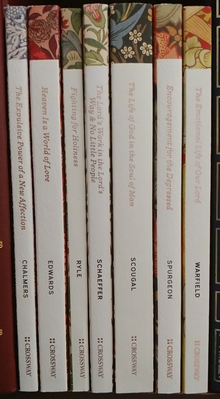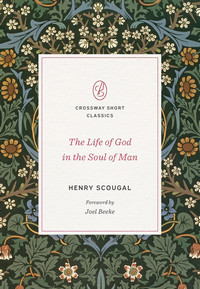 Crossway Short Classics Series
Crossway Short Classics Series
DETAILS: Publisher: Crossway Books Format: Paperback Read Date: July 2022

Some Thoughts on the Series as a Whole
The point of this series is to take classic short works—sermons, tracts, articles—package them attractively, edit a bit (modernize language, eliminate footnotes, tweak grammar, etc.) and make them widely available. Each is given a short introduction to help the reader get the context and a bit of information about the author.
I think this is a great idea, and I don’t know how I didn’t hear about this until a few weeks ago. I do hope they put out new books in the series (at least one of the books on the original list isn’t out yet, but they did publish one not on that list, so maybe they exchanged the titles).
I wonder a bit about the cover design—I wonder if the floral theme is a bit off-putting (Evangelical publishers usually reserve that for books marketed for women, and I don’t get the impression that this series is designed for that).
I don’t want to try to cover the whole series in one post, so I’m going to do this in chunks. This is the third in the series of posts I’ll be doing (and the last until early next year, when other volumes are due).

 The Life of God in the Soul of Man
The Life of God in the Soul of Man
by Henry Scougal, Joel R. Beeke (Foreward), Robin Taylor (Abridgement)
DETAILS: Publication Date: May 30, 2022 Length: 181 pg. Read Date: July 31, 2022
I’ve read this book a handful of times, and never walked away from it as impressed as I’ve heard I should be—but I keep trying. It was while reading the foreword by Beeke that I think I got an idea.
In reading Scougal’s work, one must remember that he assumes a doctrinal foundation that he does not explicitly lay out. All that Scougal writes about union with God presupposes the gospel that God the Father sent God the Son to become a man, die for our sins, rise from the dead, ascend into heaven, and reign as Lord, so that by faith in him God the Holy Spirit dwells within the heart. Scougal’s focus is quite narrow—namely, to assert that the Christian religion consists of more than just mental understanding and outward religious life by requiring an inward transformation that arises from spiritual union with Christ and communion with God.
This may say more about me than I intended, but I didn’t get that Scougal was presupposing anything, but always felt he was missing something. Working from that assumption, however, helped a lot during this read.
The last sentence in Beeke’s paragraph is a very effective summary of the book (the rest of the foreword is plenty helpful, too). Scougal focuses on the inward man, the change that has to take place—and the supernatural resources to make that change. His Christianity is an experiential, wholehearted, and supernatural one. It is near-impossible to read his work and not sense your need for deep spiritual renovation.
I don’t know the work well enough to really comment on the abridgment—but I had a couple of thoughts. The work is short enough that I wouldn’t have imagined it needed an abridgment to fit in this series. Despite having been abridged, it feels complete. So that’s got to be a good sign, right?
I’m still not convinced that I fully appreciate Scougal’s work—but I’m closer to it this time. There’s a lot to admire here, and it’s enough to make me want to keep reading until I get it.

This post contains affiliate links. If you purchase from them, I will get a small commission at no additional cost to you. As always, the opinions expressed are my own.
![]()


